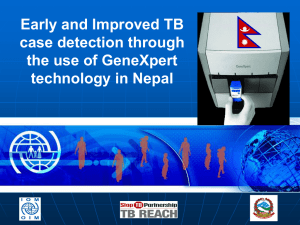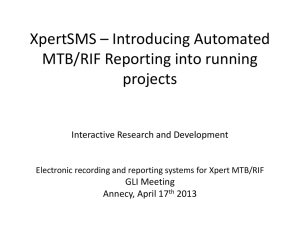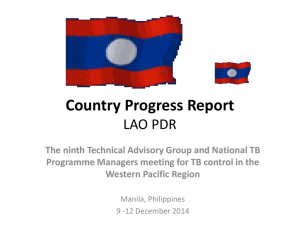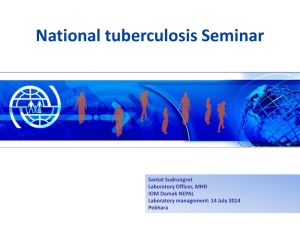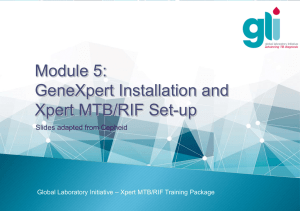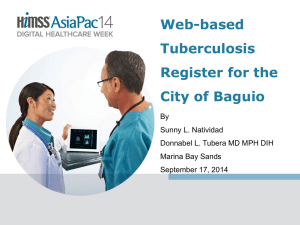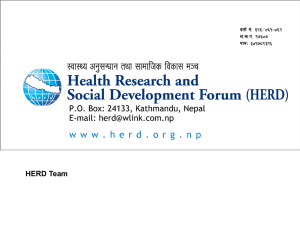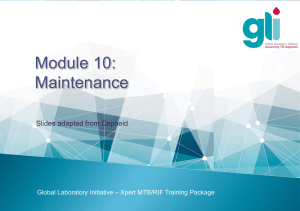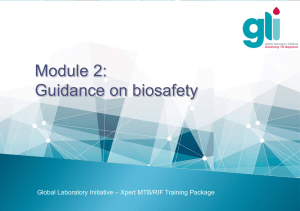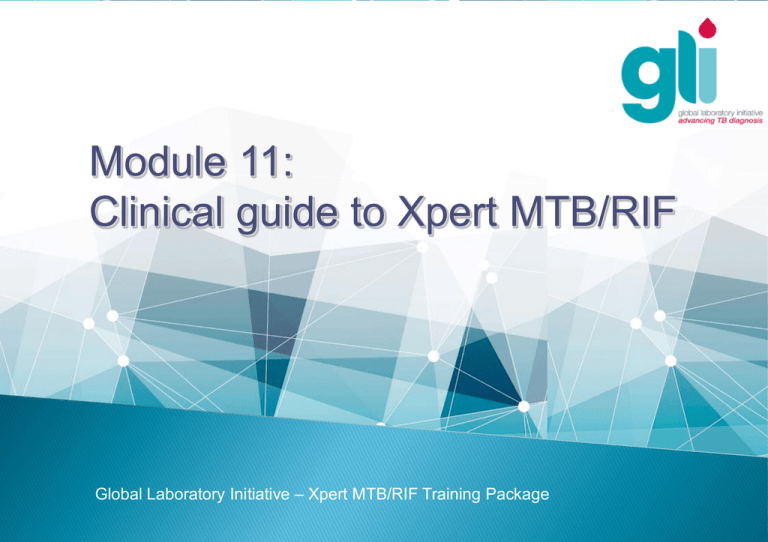
Module 11:
Clinical guide to Xpert MTB/RIF
Global Laboratory Initiative – Xpert MTB/RIF Training Package
Contents of this module
What is Xpert MTB/RIF? Procedure and technology
Diagnostic algorithm with Xpert MTB/RIF and interpretation of results
Sputum collection
How to record Xpert MTB/RIF results
Follow up testing
Referral system for samples, results and patients
-2-
Global Laboratory Initiative
Xpert MTB/RIF Training Package
At the end of this module, you will be able to:
Describe the role of Xpert MTB/RIF testing in diagnosis of TB and
MDR-TB
Interpret Xpert MTB/RIF results
Explain and discuss Xpert MTB/RIF algorithms for diagnosis and
management of TB and MDR-TB
-3-
Global Laboratory Initiative
Xpert MTB/RIF Training Package
1. What is Xpert MTB/RIF ?
-4-
Global Laboratory Initiative
Xpert MTB/RIF Training Package
A review: shortcomings of conventional diagnostic methods
for detection of TB and rifampicin resistance
Sputum smear microscopy is most commonly used in most
resource-limited settings to detect TB. However:
◦ Microscopy detects acid-fast bacilli (AFB) but does not differentiate M.
tuberculosis from other AFB, including non-tuberculous mycobacteria (NTMs)
◦ It misses many cases of TB, particularly in people with HIV
◦ It does not detect drug resistance
Sophisticated laboratories have been required to detect rifampicin
resistance
◦ Central-level laboratories with strict biosafety measures and highly trained
staff are needed for performing culture or molecular line probe assays
◦ Culture can take up to 12 weeks for results
-5-
Global Laboratory Initiative
Xpert MTB/RIF Training Package
Xpert MTB/RIF assay
-6-
Xpert MTB/RIF:
◦ A molecular test that is able to detect both TB and rifampicin resistance in a single test in less than
2 hours
◦ Much more sensitive than smear microscopy for detection of TB, including HIV-associated TB.
Sensitivity is similar to solid LJ culture
◦ Does not detect non-tuberculosis mycobacteria (NTM), unlike smear microscopy
◦ Used on the multi-disease GeneXpert platform, which can be placed at lower-level laboratories and
health centres
Single source provider: Manufactured by Cepheid (Sunnyvale, USA)
Global Laboratory Initiative
Xpert MTB/RIF Training Package
Include additional slides from Module 6, if needed
The PCR target is the 81 bp region of the rpoB gene: 5 probes bind to wild-type, but not mutant target
Molecular
Beacon
Target
Hybrid
SPC
Each probe is labeled with a different fluorescent dye,
permitting simultaneous detection
-7-
Example of RIF-Sensitive Profile – 5 probes & sample
processing control (SPC) show fluorescence
Global Laboratory Initiative
Xpert MTB/RIF Training Package
Procedure for the Xpert MTB/RIF test
-8- CC et al. N Engl J Med 2010;363:1005-1015.
Boehme
Global Laboratory Initiative
Xpert MTB/RIF Training Package
Reference Lab
Surveillance
Regional Lab
Faster than solid
culture
LJ- 40 days
MGIT
15 days
LPA
1 day
In-house DST
< 2 hours
(MODS, NRA, CRI)
Peripheral Lab
More sensitive than
microscopy
Smear
LED +10%
sensitivity
Xpert +40%
sensitivity
Clinic / Health Post
Simpler than
microscopy
Xpert MTB/RIF
can be placed at
all levels of the
network if basic
conditions for
electricity,
placement and
biosafety
measures similar
to smear
microscopy can
be assured, and
machine
throughput
utilized
effectively
Symptoms
-9-
Global Laboratory Initiative
Xpert MTB/RIF Training Package
Consider adaption /removal if not in accordance with NTP guidelines
Strong recommendations
Xpert MTB/RIF should be used rather than conventional microscopy,
culture and DST as the initial diagnostic test in adults presumed to have
MDR-TB or HIV-associated TB (high-quality evidence)
Xpert MTB/RIF should be used rather than conventional microscopy,
culture and DST as the initial diagnostic test in children presumed to have
MDR-TB or HIV-associated TB (very low-quality evidence)
-10-
Global Laboratory Initiative
Xpert MTB/RIF Training Package
Consider adaption /removal if not in accordance with NTP guidelines
Conditional recommendations (recognizing major resource implications)
Xpert MTB/RIF may be used rather than conventional microscopy and culture as the
initial diagnostic test in all adults presumed to have TB (high-quality evidence)
Xpert MTB/RIF may be used rather than conventional microscopy and culture as the
initial diagnostic test in all children presumed to have TB (very low-quality evidence)
Xpert MTB/RIF may be used as a follow-on test to microscopy in adults presumed to
have TB but not at risk of MDR-TB or HIV associated TB, especially in further testing
of smear-negative specimens (high-quality evidence)
-11-
Global Laboratory Initiative
Xpert MTB/RIF Training Package
Consider adaption /removal if not in accordance with NTP guidelines
Remarks (1 of 2):
•
These recommendations apply to the use of Xpert MTB/RIF in processed and unprocessed
sputum specimens;
•
These recommendations also apply to gastric lavage aspirates from adults and children
based on the generalization of data from children;
•
These recommendations support the use of a single sputum specimen for diagnostic
testing, acknowledging that multiple specimens increase the sensitivity of Xpert MTB/RIF
but have resource implications;
•
Children presumed to have pulmonary TB but with a single Xpert MTB/RIF -negative result
should undergo further diagnostic testing, and a child with high clinical suspicion for TB
should be treated even if an Xpert MTB/RIF result is negative;
-12-
Global Laboratory Initiative
Xpert MTB/RIF Training Package
Consider adaption /removal if not in accordance with NTP guidelines
Remarks (2 of 2):
•
Conventional microscopy and culture remains essential for monitoring of therapy and for
DST other than rifampicin (including second-line anti-TB drugs);
•
Expanding the scope of Xpert MTB/RIF use and its placement in diagnostic algorithms will
have significant operational implementation implications and should be phased in within
the context of TB national strategic plans;
•
Emerging data show that Xpert MTB/RIF detects some rifampicin-resistant strains that are
susceptible on phenotypic DST. Sequencing of these discordant results usually resolves in
favour of Xpert MTB/RIF, and patients with these strains missed by phenotypic DST and on
first-line treatment have poor treatment outcomes.
-13-
Global Laboratory Initiative
Xpert MTB/RIF Training Package
Consider adaption /removal if not in accordance with NTP guidelines
Cerebrospinal Fluid (CSF): Xpert MTB/RIF should be used in preference to conventional
microscopy, culture and DST as the initial diagnostic test in testing CSF specimens from
patients presumed to have TB meningitis (strong recommendation given the urgency of
rapid diagnosis, very low quality of evidence)
Lymph node and other tissues: Xpert MTB/RIF may be used as a replacement test for
usual practice (including conventional microscopy, culture, and/or histopathology) for
testing of specific non-respiratory specimens (lymph nodes or other tissue) from
patients presumed to have extrapulmonary TB (conditional recommendation, very low
quality of evidence)
-14-
Global Laboratory Initiative
Xpert MTB/RIF Training Package
Consider adaption /removal if not in accordance with NTP guidelines
Remarks (1 of 2):
•
Individuals presumed to have extrapulmonary TB but with a single Xpert MTB/RIF -negative
result should undergo further diagnostic testing, and those with high clinical suspicion for
TB (especially children) should be treated even if an Xpert MTB/RIF result is negative;
•
For CSF specimens, Xpert MTB/RIF should be preferentially used over culture if the sample
volume is low or additional specimens cannot be obtained, in order to reach quick
diagnosis. If sufficient volume of material is available, concentration methods should be
used to increase yield;
•
Pleural fluid is a suboptimal sample for the bacterial confirmation of pleural TB, using any
method. A pleural biopsy is the preferred sample. The sensitivity of Xpert MTB/RIF in
pleural fluid is very low. Nevertheless, any positive Xpert MTB/RIF result on pleural fluid
should be treated for pleural TB, while those with a negative Xpert MTB/RIF result should
be followed by other tests;
-15-
Global Laboratory Initiative
Xpert MTB/RIF Training Package
Consider adaption /removal if not in accordance with NTP guidelines
Remarks (2 of 2):
•
Conventional microscopy and culture remains essential for monitoring of therapy
and for DST other than rifampicin (including second-line anti-TB drugs);
•
Emerging data show that Xpert MTB/RIF detects some rifampicin-resistant strains
that are susceptible on phenotypic DST. Sequencing of these discordant results
usually resolves in favour of Xpert MTB/RIF, and patients with these strains missed
by phenotypic DST and on first-line treatment have poor treatment outcomes;
•
These recommendations do not apply to stool, urine or blood, given the lack of
data on the utility of Xpert MTB/RIF on these specimens.
-16-
Global Laboratory Initiative
Xpert MTB/RIF Training Package
Policy Update
Accompanying Implementation manual,
which provides:
Guidance on updated
diagnostic algorithms
using complementary
methods
Budgeting guidance
Annex of SOPs for
processing
extrapulmonary
specimens
Available at: http://www.who.int/tb/laboratory/mtbrifrollout
-17-
Global Laboratory Initiative
Xpert MTB/RIF Training Package
2. TB diagnostic algorithms with Xpert MTB/RIF and
interpretation of results
-18-
Global Laboratory Initiative
Xpert MTB/RIF Training Package
-19-
Add your country’s diagnostic algorithm (flow diagram) incorporating Xpert
MTB/RIF in relation to other diagnostic and screening tests, including
microscopy, chest X-ray, culture and DST, for different patient groups
Indicate in the flow diagram what are the steps when Xpert gives a RIF resistant
result, but a second test (Xpert or another DST method) gives a RIF susceptible
result
Discuss which categories of patients will receive Xpert MTB/RIF testing
Add your country’s clinical guidelines on case and patient management after
Xpert testing
Global Laboratory Initiative
Xpert MTB/RIF Training Package
For detection of rifampicin resistance:
Sensitivity of Xpert MTB/RIF compared to phenotypic DST: 95%
Specificity of Xpert MTB/RIF compared to phenotypic DST: 98%
However, phenotypic DST also misses some truly resistant strains.
In case of Xpert MTB/RIF-detected rifampicin resistance but phenotypic rifampicin
susceptibility, only sequencing can resolve the discrepancy to understand the true
resistance
The detection by sequencing of a change in the amino acid sequence of the rifampicin
resistance-determining region (RRDR) should be considered confirmation of clinically
significant rifampicin resistance
A second Xpert MTB/RIF test may be used to ensure there were no pre- and post
analytical errors (mistakes in labeling specimens or reporting results), especially for
patients who were not considered at risk for rifampicin resistance
-20-
Global Laboratory Initiative
Xpert MTB/RIF Training Package
Adapt according to NTP guidelines in your country
-21-
Person who has been treated with anti-TB drugs and in whom pulmonary
TB is suspected, that is, all retreatment categories (failure, relapse, return
after loss to follow-up)
Person suspected of having pulmonary TB at risk of harbouring MDR-TB
bacilli (risk groups as defined in current WHO guidelines for DR-TB
management)
Any other person suspected of having TB and considered at higher risk of
MDR-TB as per national policy/guidelines
Global Laboratory Initiative
Xpert MTB/RIF Training Package
Adapt according to NTP guidelines in your country
If MTB detected RIF resistance NOT detected: start or continue patient
on Cat I treatment
If MTB NOT detected: conduct follow-on diagnostic evaluation or
treatment according to the national algorithm for bacteriologically
negative TB. (Especially for symptomatic presumptive TB cases, TB should
still be considered a realistic option)
If test result is error, invalid or no result: collect 1 more sputum for
repeat Xpert testing
-22-
Global Laboratory Initiative
Xpert MTB/RIF Training Package
Adapt according to NTP guidelines in your country
-23-
If MTB detected RIF resistance detected:
◦ Start patient on MDR-TB regimen
◦ Send additional specimen for further DST, to determine complete drug
resistance profile for further refinement of regimen
◦ If patient was not considered at risk for MDR-TB, an additional Xpert
test may be performed as a confirmation, in order to be sure no
clerical or administrative errors were made in handling and registering
the specimen and reporting the result.
Global Laboratory Initiative
Xpert MTB/RIF Training Package
Adapt according to NTP guidelines in your country
-24-
Global Laboratory Initiative
Xpert MTB/RIF Training Package
Additional slides from Module 3 can be inserted as needed
3. Sputum collection
-25-
Global Laboratory Initiative
Xpert MTB/RIF Training Package
Optimal quality
Purulent
Mucoid
Suboptimal quality
Salivary
Blood- stained
- Use appropriate container for specimen collection (sterile, translucent,
combustible, leak-proof, screw-capped, wide-mouthed).
- Make sure that specimen details on container match the Lab Request Form
- At least 1 mL sputum must be collected for Xpert MTB/RIF
- Collection of sputum should be supervised
-26-
Global Laboratory Initiative
Xpert MTB/RIF Training Package
Add your local request for sputum examination form.
Demonstrate to participants how to correctly complete the form.
-27-
Global Laboratory Initiative
Xpert MTB/RIF Training Package
4. How to record Xpert MTB/RIF results
-28-
Global Laboratory Initiative
Xpert MTB/RIF Training Package
Adapt according to NTP guidelines and registers in your country
MDR-TB
suspect
HIV+ TB
suspect
Other
Xpert Exam
Results (tick box)
Date
Date
MTB
MTB
sputum results
MTB
Indet./
pos RIF pos RIF
collected released
Neg
error
sus
res
Treatment category &
Date treatment start
Suspect Classification
TB Regis-tration No.
Name of referring
facility
Address + phone number
Date of birth (Age)
Suspect ID No.
Name
(full)
Sex M/F
Date regis-tration
No.
TB suspect register
TB treatment register
Before treatment
Smear Date
Xpert Date /
/Lab No. /
Lab No./
Result
Result
-29-
Results of sputum smear microscopy and other examination
2 or 3
months
5 months
End of treatment
Culture and DST Results
Smear Date Smear Date
Smear Date / Lab
Culture Date / No. /
/ Lab No. /
/ Lab No. /
DST Date / No. / Result
No. / Result
Result
Result
Result
Global Laboratory Initiative
Xpert MTB/RIF Training Package
5. Testing for treatment follow-up
-30-
Global Laboratory Initiative
Xpert MTB/RIF Training Package
Adapt according to NTP guidelines in your country
-31-
Xpert MTB/RIF can not be used for follow up of patients during
treatment
◦ Continue to use smear and/or culture according to guidelines for
follow up of patients on treatment
Global Laboratory Initiative
Xpert MTB/RIF Training Package
6. Referral system for samples, results and patients
-32-
Global Laboratory Initiative
Xpert MTB/RIF Training Package
Adapt according to NTP guidelines in your country
Peripheral
health center
1
Xpert MTB/RIF
laboratory
2
OPD/DOTS center
3
4
Sample
5
Culture/DST
laboratory
DOTS/MDR clinic
Patient
Result
-33-
6
Global Laboratory Initiative
Xpert MTB/RIF Training Package
Adapt according to NTP guidelines in your country
Xpert MTB/RIF can rapidly and accurately diagnose TB and rifampicin
resistance, but can not be used for follow-up testing (monitoring) of patients
on treatment
Collection of good quality sputum is essential for good diagnosis, using Xpert
and all other lab tests
Collect one sputum specimen only for Xpert MTB/RIF testing (repeat in case
of an error, invalid result, or no result)
◦ Xpert is more sensitive than smear
◦ Risk assessment is an important step before sending samples for testing
-34-
Global Laboratory Initiative
Xpert MTB/RIF Training Package
Adapt according to NTP guidelines in your country
-35-
For patients with rifampicin resistance detected by Xpert MTB/RIF, start
patients immediately on an MDR-TB regimen including isoniazid, and
collect another specimen for further DST to determine the full resistance
profile.
While Xpert MTB/RIF is able to provide results rapidly, systems must be
in place for efficient sample & patient referral and reporting of results, in
order to allow for rapid initiation of appropriate treatment for patients
Global Laboratory Initiative
Xpert MTB/RIF Training Package
Assessment
-36-
Is Xpert MTB/RIF as sensitive as smear microscopy for TB detection, and
can it be used for follow-up testing (monitoring)?
What is the sensitivity of Xpert MTB/RIF compared to DST for detection
of rifampicin resistance?
Why is collection of good quality sputum essential and how would you
ensure proper sputum specimen is collected?
What are the WHO recommendations for TB detection in adults and
children using the Xpert MTB/RIF?
What is your National diagnostic algorithm?
Describe the referral system for sample, result and patient in your
country
Global Laboratory Initiative
Xpert MTB/RIF Training Package
Acknowledgements
The Xpert MTB/RIF Training Package has been developed by a consortium of
GLI partners, including FIND, KNCV, US CDC, USAID, TB CARE I and WHO, with
funding from USAID.
The modules are based on materials originally developed by FIND, KNCV and
Cepheid.

